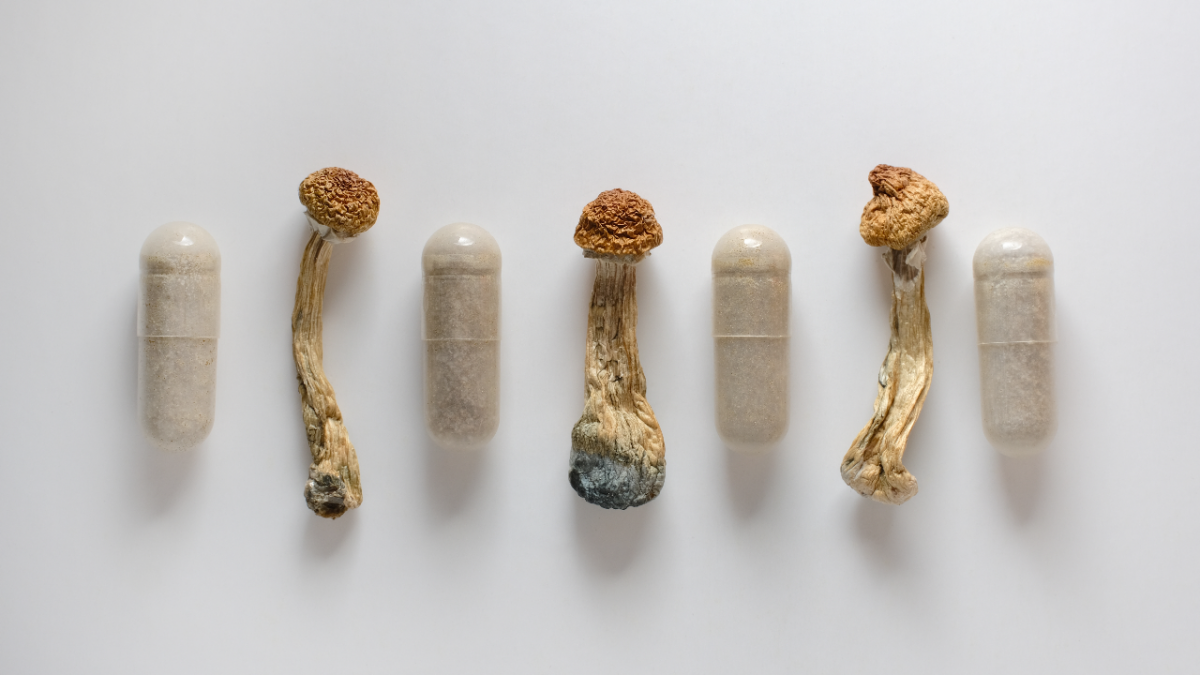When you read about “25 mg of psilocybin,” you might wonder what that actually refers to. Is it the weight of dried whole magic mushrooms?

When you read about “25 mg of psilocybin,” you might wonder what that actually refers to. Is it the weight of dried whole magic mushrooms, dried mushroom caps, or something else entirely? As the amount of peer-reviewed research on psychedelic magic mushrooms continues to grow, understanding the psilocybin content in magic mushrooms is an important nuance.
The general rule of thumb: 2.5 g (grams) dried Psilocybe cubensis (the scientific genus and species for psychedelic magic mushrooms) contains about 25 mg (milligrams) of psilocybin. Psychedelic mushrooms naturally contain a mix of compounds, including psilocybin, psilocin, baeocystin, and norbaeocystin. The amount of psilocybin in a given dried whole mushroom can vary widely depending on species, growing conditions, and even the mushroom’s age. Because of this variability, saying “25 mg of psilocybin” is a way to understand how much of the active ingredient the mushrooms contain, rather than the weight of the dried magic mushrooms themselves.
👉 [FREE DOWNLOAD] Get our 6-Part Psilocybin Guide: Whether you’re curious or preparing for your own journey, this resource will help you understand psilocybin through the lens of history, pharmacology, and modern healing.
25 mg of psilocybin tells researchers the mass of the psilocybin molecule by weight, not the weight of the entire mushroom. 25 mg of psilocybin is generally considered a moderate dose in clinical settings, often used in studies to explore effects on mood, cognition, and well-being (like the UCSF Psilocybin Clinical Trials).
By isolating the psilocybin content, researchers can provide clear information about dosage in clinical settings. This clarity matters because estimating dosage based on grams of mushrooms can lead to wildly inconsistent psychedelic experiences.
In clinical trials, like those conducted at UCSF, researchers emphasize standardized dosing to ensure safety and consistency. Almost all modern clinical trials use pharmaceutical-grade, lab-synthesized psilocybin rather than mushroom extracts. Synthetic psilocybin can be produced to exact purity and potency specifications, which is essential for dosing consistency, regulatory approval and reliable safety monitoring. Natural mushroom preparations vary in alkaloid content (psilocybin vs. psilocin vs. other tryptamines), so researchers rely on the synthetic compound to ensure each participant receives the same measured dose.
For example, a clinical trial might administer 25 mg of psilocybin to participants who are being treated for depression or PTSD. Participants are carefully screened, and the psilocybin is provided in a form that guarantees the exact psilocybin dosage. By working with measured milligrams of psilocybin, researchers can tie specific outcomes, like improvements in mood, changes in neural activity, side-effect profiles, to that precise dosage.
Outside of clinical settings, many people still use dried mushrooms and estimate dosage based on grams. A study found that a significant number of Americans are consuming psychedelic mushrooms for mental health, well-being, and spiritual exploration. Yet if the goal is to get 25 mg of psilocybin from 2.5 grams of dried mushrooms, the psilocybin content may be far more or far less than intended.
This variability can lead to an unexpectedly intense or challenging experiences or even a non-psychedelic effect. Remember that individual factors, body weight, metabolism, tolerance, (and even what you ate that day), affect how psilocybin is processed in the body.
“Stacking” refers to combining two or more substances to enhance their individual effects or create a synergistic benefit. People often “stack” supplements to target a specific goal, like better focus, energy or muscle growth. We mention stacking in the context of psilocybin mushrooms because we’ve been getting questions from our Psychedelic Info Line about several supplements. Here’s a typical list of supplements and their potential effects:
These extra supplements might seem benign or even beneficial, but they can introduce new variables to a psychedelic experience, far beyond what has been clinically researched.
Recently, a 63-year-old man was hospitalized with severe acute respiratory distress syndrome after daily use of a commercial lion’s mane extract sold as a nootropic. Extensive testing ruled out psilocybin or psilocin as the culprit, tracing his lung injury to compounds in the Lion’s made supplement instead.
Additionally, raw cacao can spike blood pressure or trigger migraines and adaptogens, like Rhodiola, can interact with stress-hormone pathways, potentially causing anxiety or insomnia.
And let’s not forget those gas station gummies. Remember, it’s impossible to know what the “proprietary mushroom blend” listed on the back of the package really contains, short of testing it in a lab. In February 2025, researchers published an analysis of recreational mushroom gummies (sold at gas stations!) in Oregon. The study screened eight gummy products for psychoactive compounds. Labeling was found to be highly inaccurate, with several products containing undisclosed (and illegal) psilocybin, psilocin, THC and 4-AcO-DMT.
👉 [FREE DOWNLOAD] Get our 6-Part Psilocybin Guide: Whether you’re curious or preparing for your own journey, this resource will help you understand psilocybin through the lens of history, pharmacology, and modern healing.
If you’re looking for personalized guidance and support before or after a psychedelic experience, the Unlimited Sciences Psychedelic Info Line offers free, 1:1 support for answering questions about psychedelic safety, integration and emotional processing. We’re an evidence-based, non-judgemental space to get the answers you’re looking for.
No comment yet.
Join our email list and get immediate access to part one of our psilocybin guide. You’ll also get the latest in how we’re bridging the gap between science and soul: psychedelic research updates, real-world findings, community-driven education, personal stories and expert insights on natural medicine.
Advancing Real-World Psychedelic Research and Science-Backed Education
Unlimited Sciences is provided with a nonprofit status by fiscal sponsorship through Realm of Caring Foundation.
Federal EIN: 46-3371348.
© 2025 Unlimited Sciences. All Rights Reserved.
Designed by Gloss